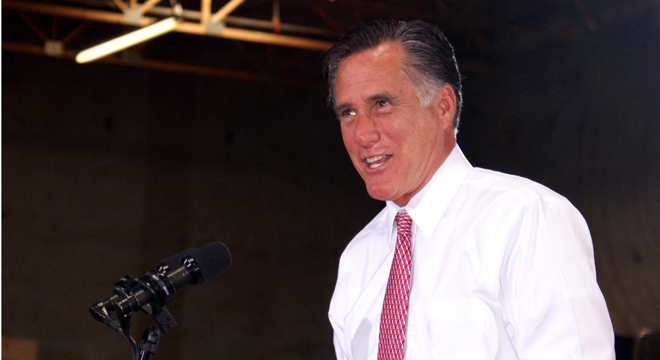Mitt Romney has a simple plan to appeal to evangelicals: he pretends he’s Rick Santorum.
The projected Republican nominee, who once chastised Santorum on the primary campaign trail for offering the base cheap thrills with “incendiary comments,” now likes to mimic Santorum when he speaks to evangelicals, a group still somewhat wary of their nominee.
What does it sound like? A promise to fix the economy by reinforcing the importance of the heterosexual family unit to an American population that has gone astray.
“We’re going to have to get America recommitted to those anchors, to the power of family,” Romney told the crowd at the Faith & Freedom Coalition conference in downtown Washington, D.C. Saturday via satellite link. “We need to strengthen the commitment that exists in this country to family.”
“Familes are an important source of strength for the nation,” Romney told the crowd. “Rick Santorum is fond of reminding us of the study that was carried out by the Brookings Institution where they looked at the qualities that were the best predictors of happiness and in this case financial wherewithal.”
Romney ticked off the familiar points from Santorum’s reading of the study easily recalled by anyone who followed Santorum’s primary campaign. The chance at poverty is lessened dramatically, Romney said, if people have “had the chance to be married,” graduated from high school and “whether they ever, one time, took a job.”
“If they did those three things, the likelihood of them falling into poverty was only two percent,” Romney said.
Between the current two candidates running for president, Romney is the one who favors limiting the number of marriages — he remains opposed to same sex marriage following President Obama come out in favor to the practice. Yet promoting marriage took a big role in Romney’s FFC speech.
“I hope to be able to talk to young people and tell them how important it is to get married before they have children because the opportunity for a mom and a dad to help guide the course of a child gives them such tremendous advantage in their lives going forward,” he said.
This, again, is lifted lock, stock and barrel from Santorum’s campaign messaging.
“You strengthen the home, you strengthen the economy,” Santorum said in the run up to the Iowa Caucuses, which he narrowly won. “I know people said, ‘Oh, just talk about the economic issues.’ You don’t talk about the family, you don’t talk about strong marriages and mothers and fathers helping to raise children, you can’t have a strong economy. At least over the long term.”
It’s not the first time Romney has used Santorum’s stump speech to reach out to the evangelicals who often turned out in greater numbers for the Catholic Santorum over the Mormon Romney during primary season. Last month when Romney gave the commencement address at the evangelical Liberty University in Virginia, he debuted his Santorum impression for evangelicals.
“Culture matters,” Romney told the Liberty crowd. “The power of these values is evidenced by a Brookings Institution study that Senator Rick Santorum brought to my attention.”
Will this work? Evangelicals in the crowd at Liberty were largely unimpressed by Romney’s suggestion that his Mormon experience has parallels with their evangelical protestant one. But polls have shown conservatives rallying around Romney, in part because he’s not Obama and in part because conservatives say he has continued to reach out to them.
For his part, Santorum seemed thrilled that Romney is carrying his banner.
“Gov. Romney’s speech today was right on,” Santorum said in his speech to FFC, shortly after Romney’s. “Not just because he quoted me.”
“His message is sound, it’s solid,” Santorum said. “The concerns I had that I was very frank about was Gov. Romney would track to the middle as many Republican candidates have done, and I’m not seeing that.”
After the speech, Santorum sang the same tune.
“He’s not stepped away from the conservatives stances he made during the primary and I’m happy to see that,” he told TPM. “I’m encouraged by it.”






